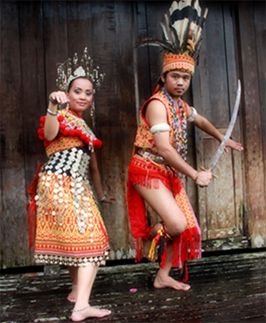The Iban is one branch of a Dayak peoples of Borneo. In Malaysia, mostly of Ibans people are located in Sarawak. They were firstly but now formerly known during the colonial period by the British as Sea Dayaks especially in the Saribas and Skrang regions which are near the coastline and thus they had gone on expeditions along the coastline up to the Kapuas river.But nowadays, most Ibans had imigrated to the upper Rajang river since their source of food are getting lesser. nowadays, most of them had migrated to the city since some of them had their own job in the city.
It is believed that the term "Iban" originates from the Iban's own formidable enemy, the Kayan. The Kayan mostly lives in the central Broneo region and migrated into the upper Rajang river and thus went logger-head with those Ibans who migrated from the upper Batang Ai/Lupar region and Katibas river. In fact, those Sea Dayaks in the Saribas and Skrang regions initially resisted being called Iban and insisted to be called Dayak but somehow the term Iban increasingly becomes popular later on after the European starts to frequently uses this term.
Ibans were renowned for practicing headhunting and tribal/territorial expansion, and had a fearsome reputation as a strong and successful warring tribe in the past. Since the arrival of Europeans and the subsequent colonisation of the area, headhunting gradually faded out of practice although many tribal customs, practices and language continue. They live at longhouse called "Rumah Panjai" where they does not have any power supply which makes them to use oil lamp during the night and just take their bath at the river.
Nowadays, most of the Iban longhouses are equipped with modern facilities such as electricity and water supply and other facilities such as (tar sealed) roads, telephone lines and the internet. Younger Ibans are mostly found in urban areas and visit their hometowns during the holidays. The Ibans today are becoming increasingly urbanised while retaining most of their traditional heritage and culture.


No comments:
Post a Comment